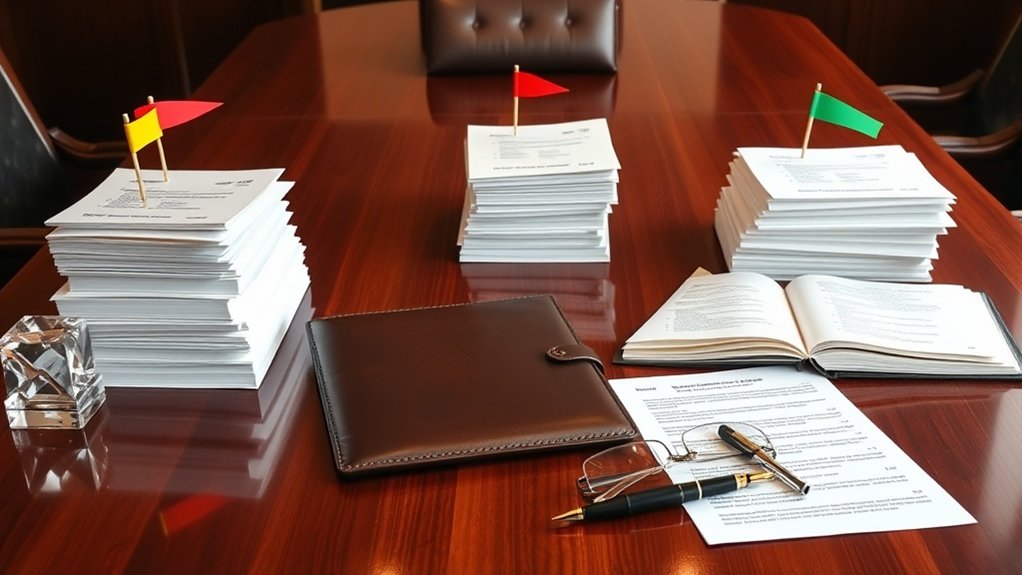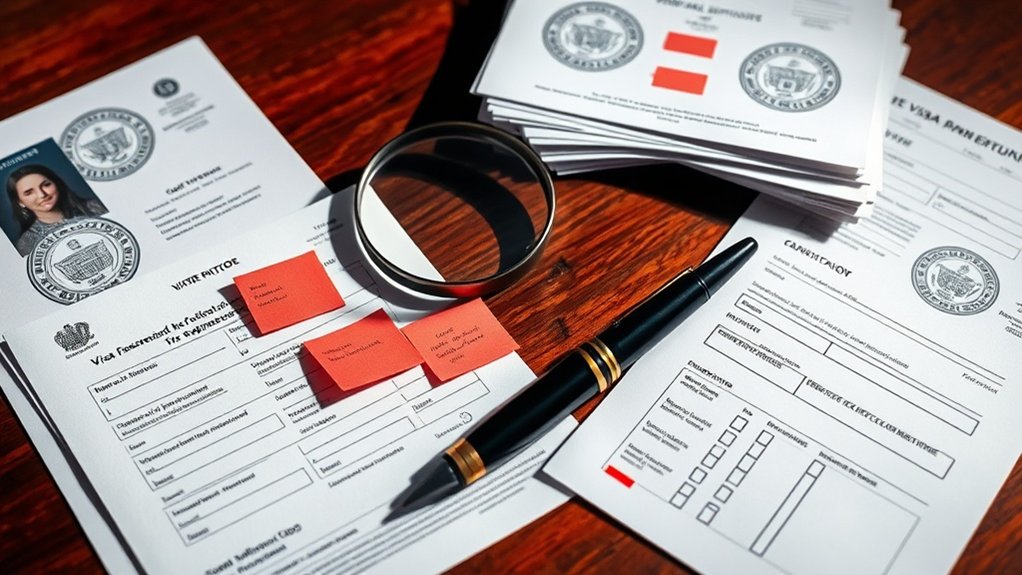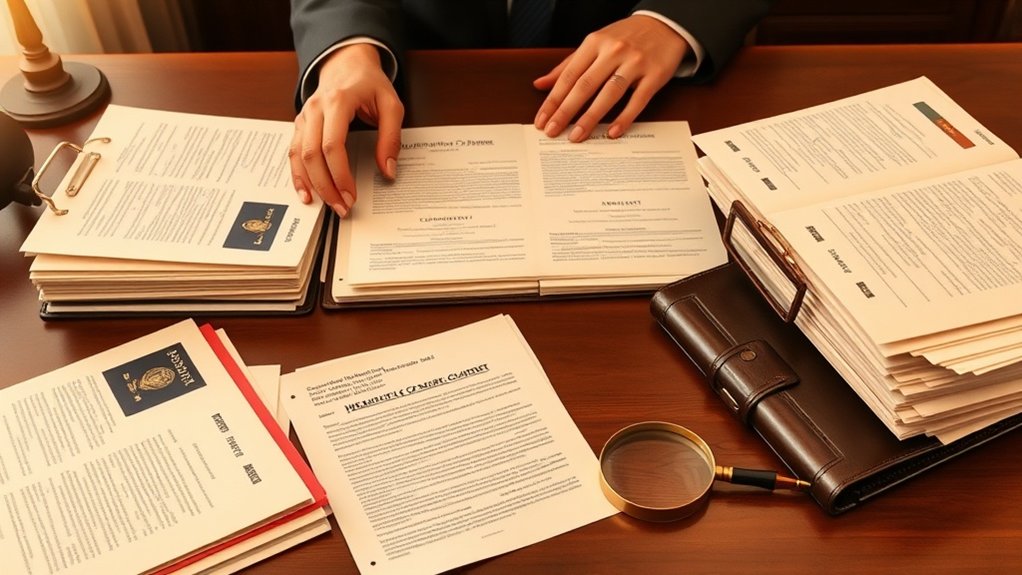You’re facing a visa application process where one overlooked detail could derail months of preparation. Consular officers scrutinize every aspect of your submission, searching for inconsistencies that suggest potential immigration violations or fraud. Most applicants don’t realize they’re presenting red flags until it’s too late—when they’re sitting across from an officer who’s already formed doubts about their case. There’s a strategic approach that identifies these concerns beforehand.
Understanding Common Consular Officer Concerns and Evaluation Criteria

When you apply for a visa, consular officers evaluate your application through a systematic lens designed to assess whether you’ll comply with immigration laws and return to your home country as planned. They’re specifically trained to identify inconsistencies, gaps, or elements that suggest overstay risk or fraudulent intent.
Consular officers examine your financial stability, employment history, family ties, and travel patterns. They’ll scrutinize whether your stated purpose aligns with supporting documentation and your personal circumstances. Officers also assess your credibility through previous visa history, including any violations or overstays.
Your application faces heightened scrutiny if you’re from countries with high overstay rates, lack strong home country ties, or present documentation that appears inconsistent. Officers evaluate whether your financial resources match your travel plans and lifestyle claims.
Understanding these evaluation criteria helps you present a coherent, credible application that addresses potential concerns before they become rejection grounds. Simple mistakes during the application process can result in unnecessary delays or denials, emphasizing the importance of thorough preparation and professional guidance.
Financial Documentation Analysis and Stability Assessment
You’ll need to demonstrate financial stability through comprehensive income verification that meets consular standards. Your documentation must include recent pay stubs, tax returns, and bank statements that clearly show consistent earnings over time. Asset documentation requirements extend beyond basic bank balances to include property ownership, investments, and other financial holdings that prove your economic ties to your home country. For investment-based immigration pathways like the EB-5 visa, lawful fund documentation becomes even more critical as you must prove the legal source of your investment capital to immigration authorities.
Income Verification Standards
Although landlords face numerous challenges when screening potential tenants, establishing robust income verification standards serves as your primary defense against future payment issues. You’ll need comprehensive documentation that proves consistent earning capacity and financial reliability.
Your income verification process should include these essential requirements:
- Recent pay stubs covering the last 60-90 days to confirm current employment status and salary consistency
- Bank statements from the previous three months showing regular deposits and account stability
- Employment verification letter directly from the employer confirming position, tenure, and annual salary
- Tax returns from the past two years for self-employed applicants or those with variable income sources
Don’t accept screenshots or photocopies—demand original documents or direct employer communication to prevent fraudulent submissions. Just as immigration lawyers require meticulous documentation to prevent costly bureaucratic errors that could jeopardize legal status, thorough financial verification protects landlords from potential rental payment complications.
Asset Documentation Requirements
Beyond verifying regular income streams, you must examine a prospective tenant’s overall financial stability through comprehensive asset documentation. You’ll need bank statements covering at least three months to assess spending patterns and account balances. Don’t overlook investment portfolios, retirement accounts, and property ownership records that demonstrate long-term financial health.
You should scrutinize transaction histories for unusual deposits or withdrawals that might indicate financial instability. Look for consistent saving habits and manageable debt-to-asset ratios. Red flags include frequent overdrafts, unexplained large transactions, or sudden account closures.
Request documentation for all liquid and non-liquid assets, including certificates of deposit, stocks, bonds, and real estate holdings. This comprehensive review helps you identify tenants who’ll maintain consistent rent payments throughout their lease term. When dealing with foreign applicants, ensure all financial documentation meets consular requirements to avoid potential complications with immigration status verification.
Demonstrating Strong Home Country Ties and Return Intent

You’ll need to prove you have compelling reasons to return to your home country after your visit. Economic ties documentation includes employment letters, business ownership records, or property deeds that show you’re financially anchored to your homeland. Family obligations evidence covers dependents who rely on you, marriage certificates, or aging parents requiring your care. Given that Brazilian immigration laws have undergone significant changes with the New Migration Law, demonstrating these ties becomes even more critical as consular officers apply updated eligibility criteria when evaluating visa applications.
Economic Ties Documentation
When consular officers evaluate your visa application, they’ll scrutinize your economic ties to determine whether you have compelling reasons to return home after your temporary stay. Your financial documentation serves as concrete evidence of your commitment to returning.
Strong economic ties include:
- Employment contracts showing guaranteed job positions upon return
- Property ownership demonstrating substantial real estate investments
- Business ownership with active management responsibilities requiring your presence
- Investment portfolios tied to your home country’s financial institutions
You’ll need to provide comprehensive documentation proving these connections aren’t superficial. Bank statements, employment letters, property deeds, and business registration certificates strengthen your case. Consular officers seek evidence that your economic interests create genuine obligations to return, making temporary travel the logical choice rather than permanent relocation. Documentation errors in presenting your economic ties can lead to application delays or rejections, making professional legal guidance crucial for ensuring all evidence is properly prepared and submitted.
Family Obligations Evidence
Family responsibilities create some of the strongest ties binding you to your home country, and consular officers recognize these connections as powerful motivators for return. Document care obligations for elderly parents, children’s school enrollment, or spouse’s employment commitments. Marriage certificates, birth certificates, and medical records showing dependents needing your support strengthen your case significantly.
School enrollment documents proving your children’s continued education in your home country demonstrate immediate return requirements. Employment letters confirming your spouse’s position create additional anchoring evidence. Medical documentation showing ongoing treatment for family members establishes urgent return obligations. Property ownership documents listing family members as beneficiaries further reinforce these ties. The legal complexities of family immigration cases require careful attention to detail when gathering and presenting documentation to avoid delays or complications. Vieira Braga Advogados ensures you present comprehensive family obligation evidence that clearly demonstrates your compelling reasons to return home after your temporary visit.
Travel History Evaluation and Pattern Recognition
Although background checks typically focus on criminal records and employment verification, analyzing travel patterns reveals crucial insights about potential security risks. Your movement history tells a story that consular officers scrutinize carefully during visa evaluations.
Frequent trips to high-risk countries without clear business or family connections raise immediate concerns. Officers examine gaps between stated purposes and actual destinations, looking for inconsistencies that suggest undisclosed activities. Your travel frequency, duration, and timing patterns help them assess whether you’re a genuine temporary visitor or potential overstay risk.
Key travel patterns that trigger additional scrutiny include:
- Multiple short trips to countries with visa-free entry to your destination
- Extended stays in regions known for document fraud or illegal immigration networks
- Travel patterns inconsistent with declared income or employment status
- Visits to conflict zones without humanitarian or journalistic credentials
Understanding these evaluation criteria helps you prepare comprehensive documentation that addresses potential concerns proactively. Experienced immigration lawyers can help identify travel history red flags and develop strategies to present your case in the most favorable light to consular officers.
Documentation Gap Identification and Resolution Strategies

You’ll encounter predictable documentation gaps during pre-screening that can derail your application timeline if left unaddressed. Missing passport pages, incomplete employment verification letters, and absent financial statements represent the most frequent document shortfalls you’ll face. Implementing systematic gap detection protocols and establishing rapid resolution workflows will keep your application moving forward without costly delays. Expert assistance ensures proper organization and translation of documents while reducing the risk of documentation errors that commonly lead to application denials and costly delays.
Common Missing Document Types
When screening family law cases, certain document types consistently surface as missing elements that can derail proceedings or weaken your position. You’ll encounter these gaps repeatedly across different case types, making early identification crucial for successful outcomes.
The most problematic missing documents typically include:
- Marriage certificates with apostille certification – Essential for proving legal union status and establishing jurisdiction
- Birth certificates for all children – Required for custody determinations and dependency claims
- Financial disclosure statements – Critical for spousal support and asset division calculations
- Domestic violence documentation – Police reports, restraining orders, and medical records that substantiate abuse claims
You can’t afford to discover these gaps during consular interviews or court proceedings. Proactive documentation review prevents delays and strengthens your client’s position significantly. Given that Brazilian immigration laws change frequently, maintaining current and complete documentation becomes even more critical for avoiding bureaucratic complications.
Proactive Gap Detection Methods
Identifying these documentation gaps before they become case-threatening problems requires systematic detection methods that catch missing elements early in your case development process. You’ll want to implement a comprehensive checklist system that cross-references required documents against your client’s specific circumstances and consular post requirements. Run parallel document audits at multiple case stages rather than waiting until final submission. Create dependency maps showing how each document supports others – missing supporting evidence often undermines primary documents. Use digital tracking systems that flag incomplete documentation chains and highlight expiration dates before they become problematic. Schedule regular case reviews with fresh eyes examining your file structure. These proactive methods transform potential rejections into manageable preparation tasks.
Swift Resolution Implementation Process
Once gaps surface in your documentation review, immediate action prevents minor deficiencies from escalating into major case delays. You’ll need a structured approach that addresses deficiencies systematically while maintaining submission deadlines.
Your swift resolution process should include:
- Priority Classification – Categorize gaps by urgency and impact on case approval likelihood
- Resource Allocation – Assign specific team members to handle different documentation types based on expertise
- Client Communication Protocols – Establish clear timelines and expectations for document collection and revision
- Quality Verification Checkpoints – Implement multi-stage reviews to ensure corrections meet consular standards before resubmission
This methodology transforms potential setbacks into manageable tasks. You’ll maintain case momentum while ensuring documentation quality meets stringent consular expectations, ultimately protecting your client’s immigration timeline.
Mock Interview Preparation and Question Anticipation

How effectively can you navigate an interview when you’re unprepared for the tough questions that reveal character flaws or problematic attitudes? Vieira Braga Advogados conducts comprehensive mock interviews that simulate real consular environments, identifying potential vulnerabilities before they derail your application.
Our preparation process anticipates difficult questions that expose inconsistencies in your story. We’ll rehearse scenarios where consular officers probe your motivations, financial circumstances, and ties to your home country. You’ll practice responding to challenging inquiries about past travel, employment gaps, or relationship histories.
| Question Category | Preparation Focus |
|---|---|
| Intent to Return | Demonstrating strong home country ties |
| Financial Capacity | Articulating legitimate funding sources |
| Relationship Authenticity | Providing consistent timeline details |
| Employment History | Explaining any gaps or changes |
| Previous Denials | Addressing past immigration issues |
Through repeated practice sessions, you’ll develop confidence and consistency, ensuring your responses align perfectly with your documented evidence and strengthen your overall application credibility.
Case Weakness Analysis and Strengthening Techniques
Even when you’ve prepared thoroughly for interviews, underlying weaknesses in your case can surface unexpectedly during the consular review process. Vieira Braga Advogados conducts comprehensive case weakness analyses to identify and address potential vulnerabilities before submission.
Our systematic approach examines every aspect of your application through the consular officer’s lens. We’ll scrutinize documentation gaps, inconsistencies in your narrative, and areas where additional evidence strengthens your position.
Our strengthening methodology includes:
- Documentation reinforcement – Adding supplementary evidence that supports weak points in your application
- Timeline clarification – Resolving chronological inconsistencies that might raise questions
- Financial substantiation – Enhancing proof of funds and income sources with additional verification
- Relationship validation – Strengthening evidence of genuine relationships through diverse documentation types
This proactive vulnerability assessment transforms potential rejection points into case strengths. By anticipating consular concerns and addressing them preemptively, we significantly improve your approval prospects while reducing interview stress.
Consular Processing Timeline Management and Expectations

Understanding consular processing timelines helps you plan effectively and manage expectations throughout your immigration journey. You’ll face varying processing speeds depending on your case type, country of origin, and consulate workload. Standard family-based petitions typically take 12-18 months, while employment cases can extend beyond 24 months.
| Processing Stage | Timeframe | Key Factors |
|---|---|---|
| NVC Document Review | 2-4 months | Completeness, RFE responses |
| Interview Scheduling | 3-8 months | Consulate capacity, priority date |
| Administrative Processing | 2-12 months | Security checks, additional documentation |
| Visa Issuance | 1-2 weeks | Medical exam validity, passport processing |
| Entry Planning | Variable | Travel arrangements, documentation prep |
You can’t control processing times, but you can influence them through thorough preparation. Submit complete documentation packages, respond promptly to requests, and maintain current contact information. When delays occur, track your case status regularly and consider congressional inquiries for cases exceeding normal processing times.
Application Consistency Review and Error Prevention
While managing timelines keeps your case moving forward, preventing errors in your application documents protects you from costly delays and potential denials. Your application’s consistency across all forms and supporting documents directly impacts the consular officer’s confidence in your case.
Vieira Braga Advogados conducts comprehensive consistency reviews to identify and correct discrepancies before submission. Our systematic approach examines every detail that could trigger red flags during consular review.
Our error prevention protocol includes:
- Cross-referencing dates and locations across all forms to ensure identical information appears consistently
- Verifying name spellings and variations match exactly between passports, birth certificates, and application forms
- Confirming employment history accuracy including job titles, dates, and employer information alignment
- Reviewing financial documentation coherence to ensure income sources and amounts correspond with stated information
This meticulous review process eliminates inconsistencies that often result in administrative processing delays or requests for additional evidence.
Strategic Presentation of Supporting Evidence and Documentation

Beyond maintaining consistency across your application documents, the strategic arrangement and presentation of your supporting evidence significantly influences how consular officers perceive and evaluate your case. You’ll want to organize documents in a logical sequence that tells your story coherently, placing the strongest evidence first to create immediate positive impressions.
Group related documents together with clear dividers and labels. Financial records should progress chronologically, showing stability and growth patterns. Employment documentation must demonstrate career progression and ties to your home country. Educational credentials should include both degrees and transcripts to establish credibility.
Vieira Braga Advogados ensures you’re not overwhelming officers with excessive paperwork while avoiding insufficient documentation. They’ll help you select precisely what’s needed, eliminating potentially problematic documents that might raise unnecessary questions. Professional translations and proper certifications accompany all foreign-language materials, preventing delays and demonstrating attention to detail that consular officers appreciate.
Frequently Asked Questions
What Are Vieira Braga Advogados’ Success Rates for Different Visa Types?
You’ll find Vieira Braga Advogados doesn’t publicly disclose specific success rates for different visa types, as these statistics can vary significantly based on individual circumstances, case complexity, and changing immigration policies. However, their pre-screening approach to identify potential red flags before submission typically improves approval odds. You’d need to contact them directly to discuss success rates relevant to your specific visa category and situation.
How Much Does the Pre-Screening Service Cost Compared to Standard Consultation Fees?
You’ll find pre-screening services typically cost 20-30% more than standard consultation fees at Vieira Braga Advogados. While standard consultations range from $200-400, pre-screening runs $250-520 depending on visa complexity. You’re paying extra for the comprehensive document review, potential issue identification, and strategic preparation that reduces rejection risks. The investment often pays off by avoiding costly resubmissions and delays that standard consultations can’t prevent.
Which Countries’ Consulates Does Vieira Braga Advogados Have the Most Experience With?
You’ll find Vieira Braga Advogados has extensive experience with US, Canadian, and European Union consulates, particularly those in Portugal, Spain, and Germany. They’ve also worked frequently with Brazilian consulates worldwide due to their deep understanding of Brazilian immigration law. The firm’s established relationships with these consular offices allow them to anticipate specific documentation requirements and questioning patterns, giving you a significant advantage when they pre-screen your application materials.
How Long Does the Complete Pre-Screening Process Typically Take Before Application Submission?
You’ll typically experience a pre-screening process that takes 2-4 weeks before your application submission. Vieira Braga’s team conducts thorough document reviews, identifies potential red flags, and prepares responses to anticipated consular questions during this timeframe. They’ll analyze your specific case circumstances, review supporting documentation, and develop strategies to address any concerns that might arise during your visa interview or application review process.
What Happens if the Consular Interview Outcome Differs From the Pre-Screening Assessment?
If your consular interview outcome differs from the pre-screening assessment, you’ll need to analyze what factors caused the discrepancy. You can appeal the decision if procedural errors occurred, reapply after addressing identified issues, or explore alternative visa categories. The pre-screening helps minimize surprises, but consular officers have discretionary authority. You should review the rejection reasons carefully and develop a strategic response plan with your legal counsel.
Conclusion
You’ll significantly increase your visa approval chances by partnering with Vieira Braga Advogados for comprehensive pre-screening. They’ll identify potential red flags before submission, strengthen weak areas in your application, and ensure you’re thoroughly prepared for consular questioning. You won’t face unexpected surprises during your interview when they’ve already anticipated officer concerns and helped you address documentation gaps. You’ll present a compelling, consistent case that demonstrates your genuine intent and qualifications.
